 Jerry Joseph
Jerry Joseph
Love & Happiness
Back Door Records
Jerry Joseph is a local treasure. More precisely, he’s a regional treasure. But, given that the public’s attention span seems to be approximately fourteen months in duration– most people probably think he’s a Portland boy. Having been in Portland for five years certainly qualifies Jerry for resident status– using the Art Alexakis/ Pete Droge scale. And then, the public being somewhat slow on the uptake, many people don’t know who he is. Maybe if he called himself Jerry Little Women, he’d get more respect.
Respect is what he deserves, For Jerry Joseph is a legitimate folk bard in the tradition of John Prine, Townes Van Zandt and, occasionally, John Mellancamp and Bruce Springsteen. He tells real-life stories about the real human condition. They’re not always pretty tales, but Joseph is adept at packaging his material in attractive wrapping. Sometimes you don’t know what you’re hearing until you’re singing it back to yourself in the car two days later.
Take “Two Balloons,” for instance. On the surface it’s a rollicking Zydeco flavored tune about two balloons. Ah Spring. 500 luftballoons! But what ho. Jerry found these balloons “underneath somebody’s tongue.” Well, that’s an odd place to look for ’em– unless you’re expecting to find them there. Either there or up somebody’s lower intestinal tract, if you catch my drift. The arrangement is a sly one. Rob O’Hearn’s chuckling Farfisa dances atop a confection of chiming acoustic and electric guitars. It’s such a party, one fails to take notice of the more sinister lyric: “Two balloons, a means to find my courage/ Well it’s easier and cleaner than a gun.”
The groove of “Criminals In The Closet” takes a funkier turn– in the direction of Little Feat. But lyrically… yikes! “Hey now, hey your love’s gonna kill me dead/ Just like a shot right to my head.” Fans of Karl Wallinger’s World Party will hear echoes of the song “Private Revolution” in this cut.
A certain laid-back, Americanized, “Beast Of Burden” feel invests “New Psychology Of Love.” Vocally sounding not unlike Graham Parker, Joseph honestly confronts contemporary social issues– with his humorous take on the boy meets girl: at a Sexual Addiction therapy group theme. Only in the 90’s. O’ Hearn provides the perfect Wurli fills throughout.
With “War At The End Of The World.” Jerry transforms Mario Vargas Llosa’s novel into an apocalyptic parable worthy of the real Bob Dylan. Saints and dwarves and a circus troupe stand toe to toe against the forces of evil at Armageddon. Now that’s Rock & Roll! Keyboardist Chuck Leavell (Allman Brothers, Sea Level) adds appropriately tasteful Hammond pads over a gospel tinged arrangement. “Yellow Ribbon” makes a move in the direction of Bruce Springsteen (with touches of the Stones’ “Dead Flowers”), especially in the rousing chorus– which features sterling background vox by Carla Russel.
“Glow” brings to mind the work of John Hiatt– Jerry even sounds like him here. Kevin Holly’s electric sitar creates the signature theme, O’Hearn’s odd choice of an orchestral synth patch colors the turnarounds with an unusual hew. Background la-la vocals also seem somewhat inappropriate to Jerry’s style. “Henry” works much better. Holly’s subtle slide guitar fills and Leavell’s organ drones are a much better setting for Jerry’s cryptic, uncomplicated vocal approach.
The down-homeliness of the homilies rendered on “Election Day” highlight Jerry’s strength. His music and his message are not necessarily pretty or pleasant. But they are endearing, like a favorite old baseball mitt: tough leather, worn soft through years of use and abuse– but with a pocket big enough to hold a cantaloupe.
In some ways Jerry Joseph calls to mind Kurt Cobain. Not musically so much as psychically; though, Jerry made it through the firestorm of drugs and life and music. Love & Happiness is an accurate and honest account of that journey.
 The Dandy Warhols
The Dandy Warhols
Dandys Rule OK
Tim Kerr Records
You know, I think they’re right. Dandy Warhols actually do rule. If you can listen to “Lou Weed” and not agree that this band is up to something fresh, new (while remaining reverent to their rock heritage) and exciting– then you are missing the point. This band is beyond infectious. They’re epidemic.
They’ve come at just the right time. I don’t know if you’ve noticed, but I’ve been told that grunge is dead. Not a moment too soon to my way of thinking, since the highpoint was Nevermind. The Dandys have arrived at a time when the musical paradigm is due for major shiftage. And the sound they’ve got fits in well with what’s bound to come next.
For, the whiney, misplaced rage of grunge is giving way to the snotty, misplaced discomfort of the English sound. The Dandy’s sound English, with the added benefit that they are not. As if Oasis were from Old Town. It’s New Liverpool Way West! It’s the Portland sound!
It’s not like everything that’s here works all the time. On the contrary, several tracks disintegrate under close scrutiny. But those that hold together (“Lou Weed,” “T.V. Theme Song,” “Nothin’ To Do,” “Nothing” “Grunge Betty”) create a definitive sound, and that sound is absolutely dandy.
Lead singer, guitarist and songwriter Courtney Taylor is no stranger to popularity, though he has stepped out of the shadows– where he lingered as drummer for Beauty Stab, to stand in the spotlight as the Dandy frontman. Peter Holmstrom provides an ever shifting kaleidoscope of guitar patterns– wah-wah washes here, shimmering chorused choir tones there. A seductively psychedelic sound, that is punctuated by Eric Hedford’s solid drumming and Zia McCabe’s unobtrusive basswork.
The songs that rock are memorable and irresistible. To say too much about “Lou Weed” would be unfair. But it is a true classic. “Nothin’ To Do” is propelled by Hedford’s propulsive snare smacking. Over that, Taylor and Holmstrom add a twisting riff. Courtney’s breathless, sleepy vocals deliver the proper hip detachment that every cool band must have. “Grunge Betty” has a hook big enough to catch a marlin.
The more indolent numbers take longer to develop. And it probably helps to be under the influence of yer drug of choice when listening– this option renders several of the tracks into lush, lavish sensual experiences. Speaking of Lush, the Dandy’s approach that state with “Nothing.” Courtney’s vocals sound as if they are being beamed across a great void. The intro to “Not Your Bottle” could be a Cobainisition– three stark chords. But as Hedford kicks in on drums, Holmstrom provides the spaghetti western guitar; steering the song away from easy comparisons. And when the song truly falls together, at the three minute mark, the band sounds nothing like anything grunge.
It takes a good two minutes for “Genius” to get fully under way, when it finally does– it swings into a brilliant chorus before dissolving back into it’s component parts. “Dick” spins around on a seventh chord for the longest time, while atmospheric guitars strut and fret in the background. The vocals enter almost subliminally and swirl around ethereally with no real destination. It’s true that the Dandy’s are rarely in a hurry to get where they mean to go. It’s part of their charm.
Perhaps the band becomes a bit self-indulgent with the never-ending “It’s A Fast-Driving Rave-Up With the Dandy Warhols’ Sixteen Minutes,” a twenty-minute opus that goes on about eighteen minutes too long– but for drummer Hedford’s contributions of antique synthesizer noises created on a rig that is older than he is. You don’t get those sounds on digital synths. All this to edify a remote joke in context to their name. But wait! The reprise of “Dick” that comes after is well worth waiting for. Guest Derek Ecklund interjects actual sitar into the drowsy melange of sounds. All for the better.
Here’s a band that really can’t go wrong, They’ve got an attitude, which is the right attitude for their music. But the Dandy Warhols don’t take themselves too seriously. And in a world where everything is so damn serious, that is one refreshing change. Ok!
And, by the way, Tony Lash is an engineering god.
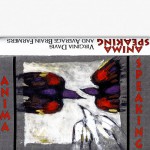 Virginia Davis
Virginia Davis
and Average Brain Farmers
Anima Speaking
Self-Produced
“This piece is for grave robbers and child molesters” intones poet Virginia Davis to open her spoken word/ improvisatory jazz recording Anima Speaking. Virginia has been a well-known figure upon the Portland poetry scene for the past ten years. This is her first venture in to the mixed media realm– and it serves to act as accompaniment to the publication of her book of the same name. Here she is supported by a stalwart staff of back-up musicians– Bob Wadle on bass and guitar, Ken Woodside on drums; Kate Breimayer, Gerry Ostrem and Courtney Von Drehle comprise the reed section.
What you get is a beat set for the cocktail generation; though way over the heads of most, both emotionally and intellectually. What Virginia creates is not a trend skating fashion statement. She picks at the festering sores of her life, intuitively understanding that it is the only way by which they may heal.
Virginia’s arabesque of a mad, smoky tavern scene, “Still Life is Death: A Frame,” hints at recollections of Captain Beefheart’s groundbreaking album Doc At The Radar Station, while describing the (in)action attendant to the peregrinations of the denizens of that particular purgatory. Wadle’s seductive guitar and bass riff forms the foundation for “On The Town’s Outskirts.” Nursery rhymes for a lost generation.
“That There Should Not Be Any Form” is a hit song for the 21st century– “That there should not be any form/The crowd screaming for noise/One body to rise/That there should be emptiness at the edge/There, nothing presses/A line of melody/Carried by a boy/Stolen by a sparrow.” This, underpinned by Wadle’s lovely bass lattices and the incessant mewling saxes combines to form a breathtaking piece– with both form and substance.
“Trashcan Tommy” is a hip tale, reminiscent of Laurie Anderson, that is both stark and harrowing in its’ unrelenting truth of vision. Another cohesively pristine presentation, guaranteed to boggle the mind of the unwary listener.
The Led Zep riff is an interesting touch on “Tonight The Moon Hangs Half-Sliced Over.”
“Spawn Of The Gun” recalls the work of Deborah Iyall and Romeo Void. About the time you can’t stand those infernal saxes, the band takes a hard left– wherein Ostrem contributes a lilting harmonica over Von Drehle’s accordion and Breimayer’s haunting clarinet to create a tender bed upon which Victoria’s sweet words lie.
This is brave work. Virginia Davis is a true artist, a real and profound poet. Her words spark like flint on tinder. They wisp into flame and throw light on the darkest corners of the human psyche.
Average Brain Farmers are an adventurous band. At times, too adventurous. At times it sounds like Virginia chanting over a fusillade of dueling sax players– who will not stop firing long enough to hear what the enemy is doing. No sonic space. Von Drehle’s interjections are generally melodic and relative to the stated theme. But those subtleties are often buried in the scree and debris of the reed avalanche. Wadle and Woodside are worth their weight in gold at all times.
But, on the many occasions when the elements bond to form an actual molecule– this is sublimely heady stuff– that skirts the boundaries erected by contemporary conformity and status quo.
And, by the way, Drew Canulette is an engineering god.
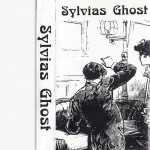 Sylvias Ghost
Sylvias Ghost
Sylvias Ghost
Self-Produced
It’s hard to see the smoke machines churning out the fog, when listening to a recording of Sylvias Ghost. But if you close the flue on the fireplace and crank up the stereo you can get a pretty good feel for the show staged by this earnest and intelligent band.
The brooding pall cast over “Epidemic” is a melancholy melange of Ken Westin’s guitar
and Mike Draper’s bass mixed with Ken Bancroft’s vaporous synth layers. Vocalist Billy James veers in the direction of Jeff Buckley, singing a provocatively gothic melody over the ceaseless plague march of Jason Mockley’s drums. “On they’ll stride who made their better day/while lost are those who chose to simply stay/hopeless in hope and happiness today/will seek the wage they never could pay.” Well, that’s almost a heavy thought. Nevertheless, it all sounds pretty heavy, given the musical context.
“Unspoken” twirls upon a delightful filigree of Draper’s bass and Westin’s guitar. James’ pleasing tenor lightly treads a delicate melody– upon which one gorgeous chorus ensues. Bancroft’s piquant synth shoots subtle starlight through a dense haze of shimmering guitars. Here again the lyrics don’t quite rise to the level of the musicianship. But the words are certainly heartfelt and sincere. And that’s really of no great consequence anyway. This is a fine piece of work.
The ominous tone of “Seven” is heightened by an obscure lyric. Bancroft’s synth work on this track is a true thing of beauty– wailing violins, gentle marimbas, sitars– all carefully applied to the mix. The cut breathes.
Sylvias Ghost are a very promising band. They have all of the tools necessary to succeed. They are monstrously sensitive as musicians. What they need is an original stance from which to launch their musical quests. A deeper inquiry into the machinations of the human animal; a mission to explore the deeper emotions that lie beneath the clichés they now employ, would doubtless yield for them a long and rewarding journey– smoke machine or no. This is not the last to be heard from Sylvias Ghost.
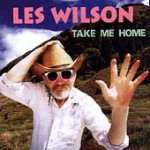 Les Wilson
Les Wilson
Take Me Home
Folk You Records
Sentimental poignancy or cruel hucksterism– you be the judge. Vox populi or vox Popeye? It’s Walter Brennan for the 90’s. That mule, Ol’ Rivers… and me.
Oh, the arrangements of these eight country standards sparkle with gleaming facelessness. Producers Todd Chatalas and Eric Flagel (Folk You) play the music exceptionally straight. Which is more than can be said of Les. To be kind, Mr. Wilson has no sense whatsoever of tone, melody, timing or anything musical– other than a faint recollection of the words.
So, what you get is a recording that sounds like a drunk at a country karaoke bar, or Foster Brooks doing the Boxcar Willie songbook. This could be considered a vanity recording, but for the fact that it’s obvious Mr. Wilson has no vanity to begin with. Otherwise, he never would have recorded this mess in the first place.
This is sad. Listen to him charge through “Deep In The Heart Of Texas” like a runaway twenty-mule team. He handles “Hey Good Lookin'” fairly well, if amelodically. “Blue Moon” sounds like some old guy has been made to perform at a retirement home talent show– against his will. On “South Of The Border,” it sounds as if Les is about to cough up a lung. The upbeat arrangement of “Love Me Tender” is way over Les’ head. “Jambalaya” is a farce, like hearing a wino under a bridge singing along with his Walkman. “Home On The Range” is more up Les’ alley (so to speak)– in that, given enough imaginative leeway, one might be able to think of the poor guy as an old cowboy.
This review may seem cruel. But it’s a cold and cruel recording. KEX is yucking it up over the morning airwaves playing Les Wilson. Lot of laughs.
The thought that people may have charged this man money to record (and press CD’s no less) this project seems positively sinister. That money could have been donated to a charity or used to create a scholarship fund for young musicians. Something worthwhile.
Obviously this is someone’s idea of a joke. But it is a mean-spirited joke at best. Someone took advantage of an old man and his money. Ho ho ho. Ha ha ha. Aren’t we clever?
 Porcelain God
Porcelain God
Unstrung
Self-Produced
Funked up grunge would seem to be Porcelain God’s forte. Tightly constructed, with all the sharp edges polished smooth. They issue a relatively homogenized sound: occasionally faceless, somewhat harmless.
“Haunted Man” stands as primarily an expositional piece wherein guitarist Drew Norman displays his Vernon Reid influences. “Blind” reflects similar Living Color references, with better success, although vocalist Billy McPhee sounds more like Billy Idol than Corey Glover. Norman’s delicious interplay with bassist Will Youngman provides the main thrust for the tune as McPhee croons over the top.
The intro to “Still Mine” sounds distinctly like the Cocteau Twins (of all bands!), circulating around Norman’s careening guitar figure. McPhee contributes a less mannered vocal, which results in a very satisfying song– with a rousing powerchord chorus and a solid solo section. This cut triumphs.
“Choked” offers a nice stylistic departure, heading toward Spanish/ Classical territory through the extended intro and succeeding buildup. A kind of middle period Zep-like piece. Perhaps the strangest cut of all is “Bread & Bones” which lyrically sounds like a term paper for Comparative Kundalini Dogma 101. Kansas for the 90’s? The new Rush? Yikes! Adrian Belew is probably (hopefully?) the prototype for this experiment. And though it’s obvious that a lot of care went into this cut, with the tight harmonies and attention to detail and all; here again one must wonder what message the band truly means to impart with lines like “A chill has taken my bones to be fragile/ through countless gossamer maya existence levels/to the point my mental picture is fogged/ to find the strength to rebuild my spine.” And exactly whom is it that is going to really care if he gets his spine rebuilt or not? Probably a Sci-fi freak.
Porcelain God are different. They don’t exactly sound like anybody else. And they are not without their own certain charm. They are capable musicians and some of their material is quite good, specifically “Still Mine.” More material of this quality would doubtless garner for the band a large and committed following.
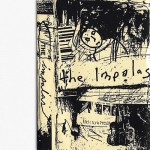 The Impalas
The Impalas
The Impalas
Self-Produced
Before they could be reviewed under the name The Impalas, the name was taken away from them via the legal system ala Apartment 3-G (Mule). This band have officially renamed themselves Richmond Fontaine. I thought there was a band called Richmond Fontaine in Texas.
This band draws inspiration from J. Mascis and R.E.M. among others, and prove themselves worthy of the correspondence. “Dayton, Ohio” spins around chiming, droning guitars and the singer, Willy Vlautin’s detached, depressed vocal. “Harold’s Club” is a little bit more rambunctious than might be expected, giving rise to some speculation as to the band’s possible shredability in a live situation.
Turning on a ringing major-7th chord, jangling against a moaning bass figure, “The Redneck” hearkens to Dino Jr., as a whining guitar line writhes beneath the forlorn vocal. “C.B. Radio” swings closer to early REMish indefatigability– with an energetic country twang thang added to the murky apocrypha of the lyrics.
The ghost of Kurt Cobain smiles wanly over the goosestepping two-step of “Laying On The Floor.” You’ve gotta check out the psycho guitar solo on this one. A work of arcane acumen. The waltzing waft of “White Line Fever” belies a dark, desolate lyric about drugs and anomie in middle America. Ee-haw!
The Impalas are a sturdy little band– not necessarily the most original group to come down the pike, but hey, you have to start somewhere. And this band is starting with a strong foundation in the basics of rock, and that’s as good as any point from which to embark.
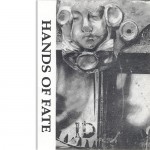 Hands of Fate
Hands of Fate
Hands of Fate
Self-Produced
Hands of Fate have only lately appeared upon the local scene. This four-song recording gives a good indication of the bands’ strengths and weaknesses.
The lead singer has a very pleasing voice. The classic pop of “Underrated” suits her girlish voice well. There’s a certain 80’s feel to the arrangement, recalling Katrina and the Waves or Robin Lane and the Chartbusters. The lead guitarist actually executes pre-meditated, melodic fills and solos– which seem especially anachronistic in the 90’s: where it seems the less you know about musicianship, the better. Be that as it may, it’s a catchy number, worthy of a listen.
The moody “Heaven” brings to mind Aimee Mann. In fact this woman has many of the same annoying vocal mannerisms, i.e.– little whimpering moans and sighs, between practiced catches of the breath; over-emoting, creating a sense that the songs are being “acted” more than actually sung.
These idiosyncrasies become problematic with “Caught You” and “Running Away.” By that time, you’ve heard the whole spectrum of her vocal tricks from black to white. This is a shame because this woman has a very nice voice. But there is more to the interpretation of a song than merely singing well and pretty with swell technique. A singer must find the truth to be found within any song, and attempt to convey it, honestly. The singer in Hands of Fate seems to have no real emotional connection to her material. Thus, there is no tension. Maybe it’s the material– which seems well written enough. Intelligent. But clichéd perhaps.
I would advise this young woman to scrap all the vocal training she has come to acquire, strip herself of the mannerisms that have her sounding like Rindy Ross fronting the Cranes; and to dig deep within herself to tap her own real emotions; and to learn to express them honestly with her unique vocal instrument. The other members of the band would do well to invest in themselves similarly.
This is a good band with good material, but none of it has much real emotional availability. Too safe. Too warm. Too fuzzy.
